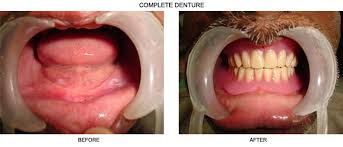Denture is an artificial prosthesis for the replacement of missing teeth. Denture is designed as a removable prosthesis and can be removed for maintenance and cleaning by the patient. Removable dentures are made for several or all teeth in one or both jaws.
Indications for denture treatment include:
- - cosmetic replacement of missing teeth
- - restoration of the oral functions of chewing, speech and swallowing.
Advantages of denture treatment include:
- - lower treatment cost
- - ease of fabrication
- - ease of maintenance and repair
BEFORE AND AFTER

Instructions for Denture Users:
- - New dentures may feel awkward for a few weeks until you become accustomed to them. The dentures may feel loose while the muscles of your cheek and tongue learn to keep them in place. It is not unusual to experience minor irritation or soreness.
- - you may find that saliva flow temporarily increases. As your mouth becomes accustomed to the dentures, these problems should go away.
- - Follow-up appointments with the dentist are generally needed after a denture is inserted so the fit can be checked and adjusted.
- - Rinse your dentures before brushing to remove any loose food or debris.
- - Use a soft bristle toothbrush and a non-abrasive cleanser to gently brush all the surfaces of the dentures so they don't get scratched.
- - When brushing, clean your mouth thoroughly including your gums, cheeks, roof of your mouth and tongue to remove any plaque. This can help reduce the risk of oral irritation and bad breath.
- - When you're not wearing your dentures, put them in a safe place covered in water to keep them from warping.
- - Occasionally, denture wearers may use adhesives. Adhesives come in many forms: creams, powders, pads/wafers, strips or liquids.
